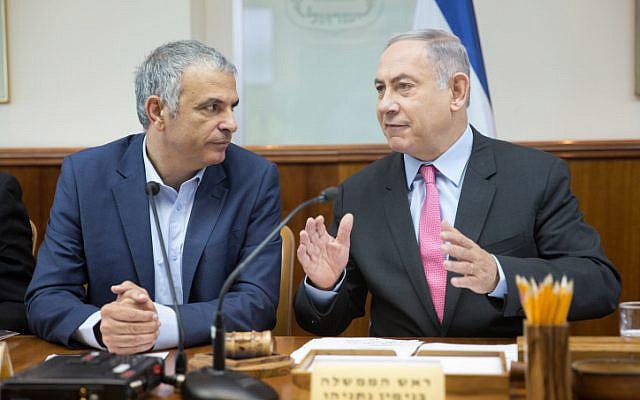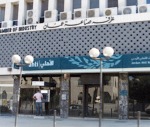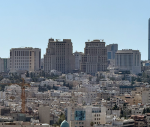You are here
Netanyahu defiant as nation-state law stirs protests
By AFP - Aug 05,2018 - Last updated at Aug 05,2018

Leaders from the Druze minority take part in a rally to protest against Jewish nation-state law in Rabin Square in Tel Aviv on Saturday night (Reuters photo)
OCCUPIED JERUSALEM — Israel’s new Jewish nation-state law has drawn tens of thousands of protesters out onto the streets, but Prime Minister Benjamin Netanyahu remains defiant over the legislation.
Saturday night’s protest in Tel Aviv, organised by Israel’s Druze minority, which says the law will legalise discrimination, was also attended by a range of former security chiefs and opposition politicians.
It was the latest sign of outrage over the law, which declares Israel the nation-state of the Jewish people while omitting any reference to equality or the country’s democratic nature.
But despite the protests, many analysts say Netanyahu could still gain from it politically ahead of elections that could come anytime from late this year to the end of 2019.
The veteran and politically savvy premier is seen by analysts as having pushed for the law to shore up his political base and fend off far-right challengers.
It is a playbook he has used in the past, including during the 2015 elections when Netanyahu warned about Arab voters “going to the polls in droves”, they say.
He now heads what is regarded as the most right-wing government in Israeli history.
“Netanyahu wants to try already now to dictate how the elections are going to be framed,” said Anshel Pfeffer, a journalist with Israeli newspaper Haaretz and author of the new book “Bibi: The Turbulent Life and Times of Benjamin Netanyahu.”
“Which is a large part of what he was doing with the nation-state law: trying to already set the tone for the election campaign even before it’s officially begun.”
‘A terrible law’
Polls have shown so far that a majority of Israelis support the law, but many are concerned over what it will mean for the country’s democracy.
There is also a deep well of sympathy for the 130,000-strong Druze community, who serve in the police and military.
Israel’s parliament will hold a special hearing on the law on Wednesday.
Netanyahu says there are other laws on the books that guarantee equality for non-Jews and define Israel as democratic.
But Amir Fuchs, of the respected Israel Democracy Institute think tank, who participated in committee meetings on the legislation as an invited expert, said that was not completely true.
Israel’s basic laws — a de facto constitution — do include references to the country as “Jewish and democratic”, but there is no specific right to equality apart from the 1948 declaration of independence, he said.
Court challenges have been filed against the nation-state law, and it will now be up to judges to decide whether to limit its interpretation.
Fuchs said he agrees, like virtually all Jewish Israelis, that the country is the nation-state of the Jewish people, but believes the law could cause real harm to minorities.
“I think that for minorities in Israel, this is a terrible law which changes the definition of Israel,” he said.
‘Under the rug’
The legislation was passed in the middle of the night on July 19 and now forms part of Israel’s basic laws.
It speaks of Israel as the historic homeland of the Jews and says they have a “unique” right to self — determination there.
The law defines the establishment of Jewish communities as being in the national interest and makes Hebrew the sole official language.
Arabic, previously considered an official language, is granted only special status.
Arab citizens make up some 17.5 per cent of Israel’s more than eight million population.
Netanyahu has held a series of meetings with Druze leaders in a bid to win them over and propose a compromise.
There have been suggestions that a separate law would be crafted addressing the status of the Druze in Israel.
On Sunday, Netanyahu announced he was forming a ministerial committee to look at the issue, while again defending the legislation, saying it could help keep Palestinians from relocating inside Israel under family reunification laws.
But Druze leaders have so far stuck to their demand that the law be amended or annulled.
If Netanyahu hoped to cast opponents of the law as unpatriotic leftists, the opposition by the Druze — respected for their military service — has put a dent in such plans, some analysts say.
“One way or the other, the rally that was led last night by the Druze community, which demanded equality for all minorities in Israel, made it clear that this problem could not be swept under the rug,” Moshe Cohen wrote in the paper Maariv.
Related Articles
OCCUPIED JERUSALEM — Two key ministers have called for changes to a deeply divisive law declaring Israel the nation state of the Jewish peop
Hundreds of left-wing Israelis demonstrated Saturday night in Jerusalem against a controversial draft law enshrining Israel’s status as the Jewish national homeland
OCCUPIED JERUSALEM — Prime Minister Benjamin Netanyahu on Sunday defended a new law declaring Israel the Jewish people’s nation state, sayin

Opinion
Apr 07, 2025
Apr 07, 2025
Apr 07, 2025
Apr 06, 2025
- Popular
- Rated
- Commented
Apr 07, 2025
Apr 07, 2025
Apr 07, 2025
Newsletter
Get top stories and blog posts emailed to you each day.
















